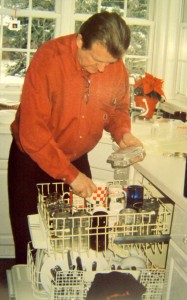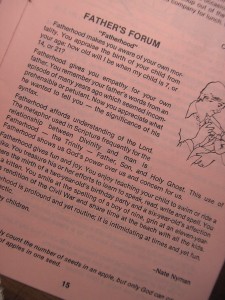A friend recently said, “I’ve been reading the blog and gosh, I never realized what a saint Nate was.”
I’m sure he was also thinking, “He wasn’t really, was he?”
If Nate had truly been a saint, we’d all have known it without having to ask. So why does he come across that way in the blog posts? I suppose it’s because I’ve chosen to share only the good things.
Interestingly, that’s easy now. It’s satisfying. In the months since he died, I’ve missed him more than I ever thought I would and have come to appreciate the good stuff anew.
Psychology experts tell us if we’re going to criticize someone, we should first speak out four praises. Thinking I was already doing that, one day years ago I decided to keep track. Sadly, I was woefully deficient in the praise category.
One thing I learned as I kept my tally was that I could improve at praising, if I practiced. I also discovered something else. When I thought nice things about Nate such as, “He looks good in that shirt,” I often failed to speak them out. If I asked God to prompt me to turn those thoughts into words, he would, but of course I had to remember to ask him.
I did learn one foolproof way to go from my spotty performance to 100% success in dwelling on Nate’s positives: hearing the words “terminal cancer.” Just knowing he would soon die was powerful motivation to change my ways. Now, looking back to the time when Nate was healthy and with me daily, I see it was pride that kept me from succeeding at this when I still could have, and it’s pitiful.
I wonder how marriages would change if wives and husbands agreed to make only uplifting or complimentary statements to one another for a week or even a month in an effort to establish new patterns. This would mean swallowing every word of criticism, all desire to change someone. It would mean continually ignoring the bad and highlighting the good… as I’m finding it so rewarding to do these days.
God knew this wouldn’t come naturally and would be hard for us, but that didn’t stop him from urging us to reach for it. When he addresses those in partnership (husbands and wives, soldiers and leaders, brothers and sisters, church members, parents and children, business partners), he urges us to be positive with our words. As a matter of fact, he elevates this to best-possible-activity level, telling us it actually brings him glory when we do it.
After nearly 11 months without Nate, my inner wish is that I could go back and try again. I know beyond all doubt I could do a much better job now, maybe even be 100%. Maybe even
.… saintly.
“May God, who gives… patience and encouragement, help you live in complete harmony with each other, as is fitting for followers of Christ Jesus. Accept each other just as Christ has accepted you, so that God will be given glory.” (Romans 15:5,7)



